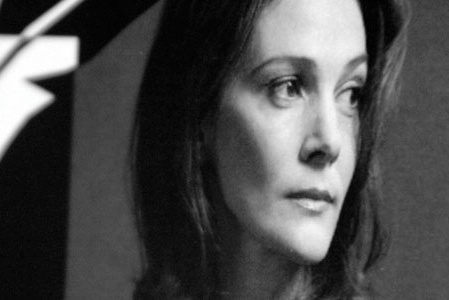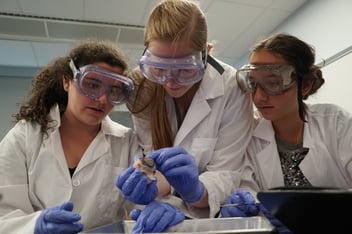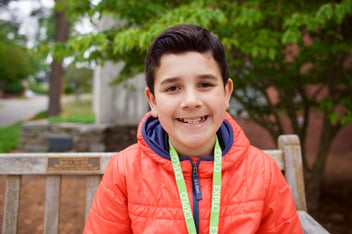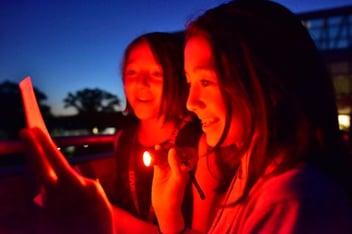Leah Hager Cohen: Reflections on Public Reading

Critically acclaimed author Leah Hager Cohen [Explo Faculty '86-'94] reflects on the nuances of public reading.
The Art of the Author Reading
Quiet. Private. Personal. These words pervade books – for authors, they describe what it is like to write; for the audience, they describe the experience of reading.
An author’s book reading, though, is something different. Readings are public, interpersonal, shared.
For writer Leah Hager Cohen [Explo Faculty, ‘86-‘94], they make real the author-reader relationship.
“The point at which other people might ask questions and might bring other perspectives into the space—” she says. “That's the sort of interaction that exists in theory when I'm writing, but I'm not really partaking of it.”
Giving a Reading in a Library
To be sure, public readings are, like solitary reading, quiet experiences.
These events take place in bookstores, coffee houses, old churches, and, like tonight’s in Belmont, Massachusetts, public libraries. At this reading, some of the people in attendance have brought books – novels, picture books, cook books – and read them in their seats. Others are in pairs – mother and daughter tandems, friends in twos. They talk in polite, hushed voices about how the semester is shaping up at Swarthmore and the relative strengths and weaknesses of the local middle schools.
“It's really wonderful to do an event in a library,” she says. “I think the people that come to a reading in a library are not necessarily the people that would make their way into a bookstore. For that reason, too, it feels nice to have that kind of contact with people from the community.”
The reading itself is quiet – one need only recall an elementary school teacher reading before a classroom to get an idea. And Cohen is a quiet presence in and of herself: she is slender and small, calm (and calming), with a soft, high-pitched voice that doesn’t naturally lend itself to filling a room. During her reading, even though she is speaking into a microphone, a man in the back row asks if she could speak up, please. (And she obliges.)
Parts of her reading are met with laughter. When it is over, there is soft applause.
How a Reading Can Transform The Way You Read
“Sometimes people laugh a lot and make me realize, 'Oh yeah, there's some dry humor here,'” Cohen says. “Until you read it out loud before an audience, you don't think of it with a comic mind. And then invariably at the next reading you do, no one will laugh at all and you think, 'My delivery's off tonight.' Generally, the mood or tone is different. People feel shy about laughing out loud with a group. I feel like the differences in the audiences always keep me on my toes.”
On this night, Cohen reads from House Lights, her most recent novel and seventh published book. The passage Cohen reads is near the beginning of the novel, when Bea, the protagonist, secretly contacts her estranged grandmother. It’s the first in what will become a series of deceptions and lies that send her once-stable family abruptly into disarray.
After she reads, there is time for the audience to ask questions. Some questions are on issues of theme (father figures as lovers, family transgressions, truth versus acting) while others probe for authorial tidbits and trivia (Cohen reveals that she originally wrote Bea’s much older lover as much, much older but reconsidered at the last minute).
“I really like that part [responding to audience's questions],” Cohen says, “because up until that point, I've generally done all the talking, which is not very interesting to me. Sometimes the questions people ask surprise me to the extent that they reveal how passionate their reaction was to the book. I've had people clearly upset with how I've written an ending, you know, because they did not want it to turn out that way. I'm always struck by how real the characters are to readers. They're really real to me, but it's always amazing when the characters are so real for the audience as well.”
After fifteen minutes, the events coordinator stops the questions, telling the audience that Cohen will now be signing copies of House Lights. The end of the question period does not, however, end the questions. Readers come to her table, following up on a question from before, clarifying a plot point, or, more than likely, offering humble praise.
“Writing is such a solitary job,” Cohen says after the room has emptied. “Any moment where you're actually in connection with readers and community is really special because they're so few and far between.”
cohen on explo
Author Leah Hager Cohen, who worked at Explo from 1986 to 1994 as an instructor and a curriculum advisor and currently serves on Exploration's Curriculum Advisory Committee, recalls what it was like working at Explo:
The level of trust the administration put in staff members was truly remarkable. I felt not only permission to make mistakes, but practically a mandate to make mistakes – in the sense that if we, as staff, were doing what we’d been hired to do (that is, be creatively bold and intellectually vigorous) then a few mistakes were inevitable.All of this, of course, took place within the essential frame of a physically and emotionally safe environment – if staff and students hadn’t felt this to be the case, no real risk-taking would have been possible. But we did have this frame, and we’d been given the administration’s trust, and we earned the students’ trust, and we had one another to spark ideas, and all of it made for an ideal crucible in which to conduct exploration.
Never before or since Explo have I enjoyed the company of such a concentrated and diverse group of thinkers and doers. The sense of possibility quivered all around. I think the students felt this, and drank it in. I suppose many of them must have felt as I did at the end of each summer: that I was leaving a little freer, more emboldened, with a happy sense of what other, as-yet-hidden treasures the world held.



